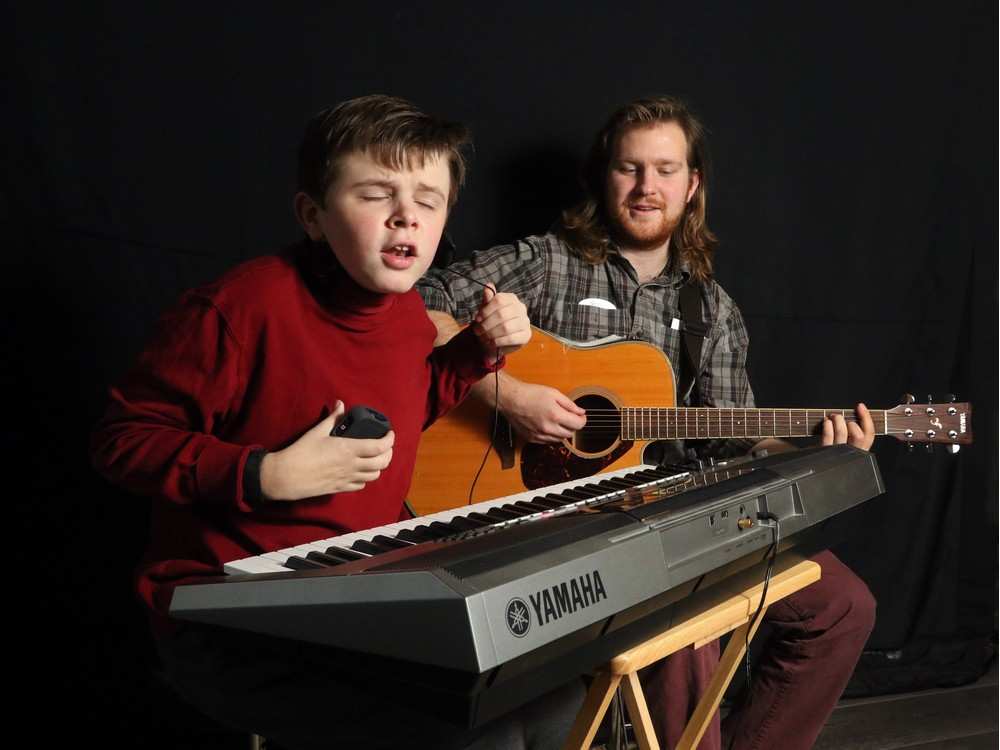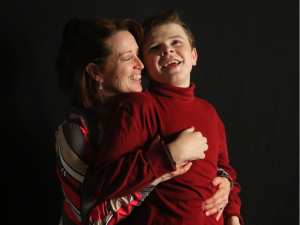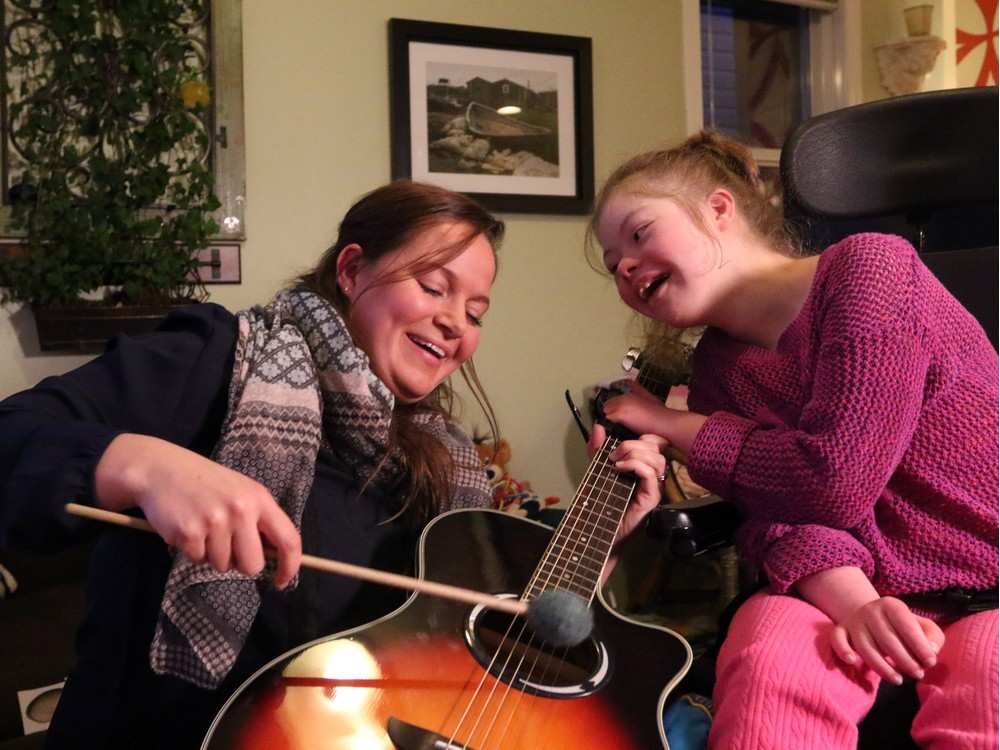The power of music for special needs kids

Dylan Whitley, 16, who has been diagnosed with Autism and septo-optic dysplasia loves music. His keen ear, pitch perfect voice and talent for musical jingles keeps JB Music therapist Max Wood on his toes. Christina Ryan, Calgary Herald.
Dylan Whitley quickly progressed from pounding on pots and pans to perfectly playing tunes on a toy piano.
By Annalise Klingbeil, Calgary Herald
By the age of three, the autistic and blind boy could play a piece of music within minutes of hearing it for the first time.
Over time, a real keyboard replaced the play one. An obsession for radio jingles developed. And, as his love of music remained a constant, Dylan honed his talents and learned key life skills in weekly music therapy sessions.

Judy Whitley shares a bonding moment with her son Dylan before music therapy in their home. Christina Ryan, Calgary Herald
The teenager remembers the feeling during his first lesson with Calgary-based JB Music Therapy, in his home when he was a preschooler. “You should have seen my energy just go way up,” he said. “Not the energy you get when you first eat and have a big sugar rush, but 10 times.”
That feeling hasn’t faded over the years for the boy born with a rare disorder called septo-optic dysplasia.
As a young child, excess noise — such as the sound of applause on television — would have Dylan banging his head on the floor and sobbing. His mom credits years of music and behaviour therapy with shaping Dylan into who he is today. “He’s an interesting guy,” his mom, Judy Whitley, said. “He’s funny. He’s quirky. He loves the ladies.”
In addition to the ladies, Dylan, 16, loves Timbits (the bite-sized morsels of quintessentially Canadian doughnuts) and music. “When I’m composing stuff . . . it’s like all sense of time just vanishes,” said Dylan. He especially enjoys creating tunes with his keyboard and a computer program, and can recite radio jingles from across the country with ease.
Judy often determines her son’s mood by what type of music she hears coming from the digital piano in his bedroom. One day it might be Mozart, the next hip-hop. “Music is where Dylan shines. It’s where he is the best of the best,” said Judy. “He has learned through JB Music about expressing his feelings through music.”
There are 650 certified music therapists across Canada who use music to enhance the physical, emotional and spiritual health of clients of all ages — from kids like Dylan who have special needs, to seniors with dementia, adults with mental illness or babies and their parents.

Emily Pitchers, 16, plucks the strings on a guitar with JB Music therapist Catherine Mitchell during a weekly session at the teenager’s family home. Christina Ryan, Calgary Herald
Over the past 25 years, JB Music Therapy in Calgary has grown to an operation that serves 1,600 clients a week at schools, hospital bedsides, long-term-care facilities and private homes. The organization’s youngest client is two months old and the eldest is 106.
“Music, as a therapy, works because it connects on a physiological level and also creates emotional triggers and cognitive triggers for us,” said Shannon Robinson, the company’s vice-president. “Music that we like can increase the release of dopamine and serotonin, which are happy, good-feeling hormones, and then that just makes us feel better. It motivates us. It creates more structure, more satisfaction in our lives.”
Clients are as diverse as the skills they gain.
Dylan has learned to take turns, compromise and express feelings — skills that haven’t always come easily. More than a decade after he was first introduced to music therapy, Dylan still attends weekly sessions. A typical lesson today sees Dylan and his therapist collaborate, discuss ideas, sing and play instruments together. “Music is just part of (Dylan’s) being, so to facilitate a session with him means you have to support where he’s at musically, but you also . . . have to give him the space to be really creative,” Robinson said.
No two hours are alike for music therapists. Some clients can’t speak; others have limited mobility and are in hospital beds or wheelchairs.
Clients include Emily Pitchers, a teen who bobs her ponytailed head to a catchy pop song during a music therapy session in her family’s Calgary home. “Can’t stop, won’t stop moving,” Catherine Mitchell, an accredited music therapist, sings while strumming her guitar. “Emily’s going to shake, shake it off . . . Let’s shake, shake, shake, shake.”
The 16-year-old sits in her wheelchair, giggles in delight, and shakes and moves to the music. Emily has numerous medical conditions, including Down syndrome and epilepsy. She doesn’t talk or walk, but for this one hour each week, her medical issues take a back seat.
“In her music therapy session, (Emily) is just a kid that likes music,” said Mitchell. “She’s allowed to totally be herself and have her funny personality, and laugh and smile and play the instruments . . . Music therapy is about having a great time while you’re doing the therapy or the task.”
Emily typically dislikes reaching for objects, grasping items and moving her limbs, but in her weekly music therapy lessons, her persistent teacher gently, and patiently, encourages her to complete these tasks. Emily lifts her leg to kick an ocean drum. She reaches for a thunder tube. And she strums her teacher’s guitar.
“Usually, when you’re laughing and having a great time, you forget that it’s work, as well,” Mitchell said.
At its core, that’s what music therapy is all about. Mitchell uses music to motivate clients like Emily and improve their quality of life. When clients start working with JB Music Therapy, a wellness assessment is used to set goals for the sessions that can translate into day-to-day life. Emily’s goals include grasping a mallet at least five times per lesson and using picture cards to make instrument choices — grasping and making decisions are both skills she relies on in the real world.
Goals change as a client masters a skill, or as a child, like Dylan, gets older.
His mom finds the sessions so helpful, she wishes she had the funds to send her child twice a week. “He just grows so much with it,” she said.
Dylan describes playing music as “energizing, just plain energizing,” a feeling that many music therapists confirm is common among clients.
“I love the clients. I love that every day is different. I love that a lot of these clients, they just show you the beauty in life,” said music therapist Mitchell.
“Working on skills that are going to help the client in their everyday life is so satisfying.”
 Source The Calgary Herald
Source The Calgary Herald
Also see
Providing therapy and comfort to young patients through music in CTV News Calgary
